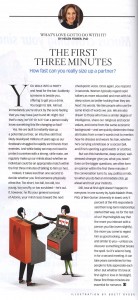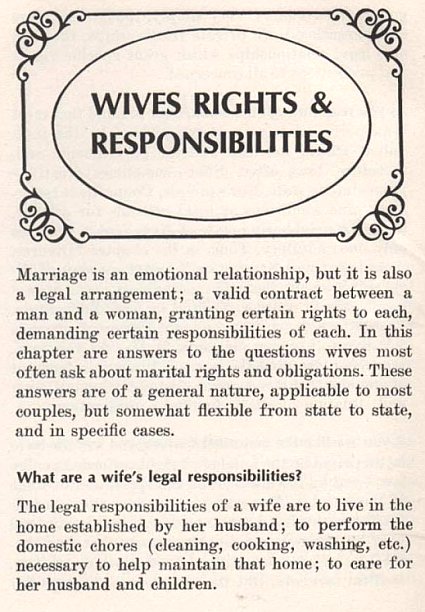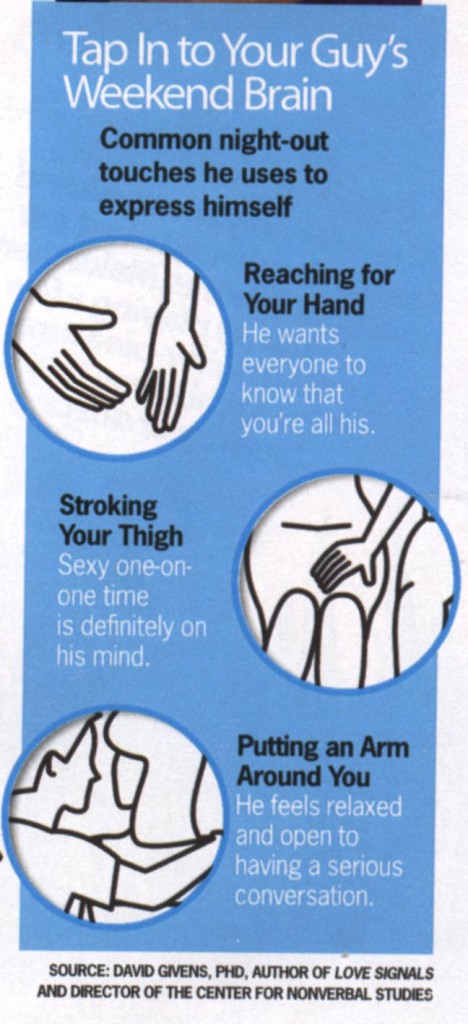I don’t get HBO, so I can’t see . But since I love Mahr and Jane Lynch, I just had to share this clip in which the dynamic duo read the Weiner text messages & tweets. I also think this is a fine time to realize how corny your own sexting sounds to others…
Category: Communication
Say it, don’t spray it! (And other ways to improve relationship communication.)
Dating Rules: Should You Say “I Love You” First?
From the “Rules that everyone tells you that are just plain stupid” files…
Relationship rule myth: Never, and I mean never, say ‘I love you’ first.
OK, suppose every single person the world-over adopted this rubbish — who would ever be told the three magic words? Someone has to say them first.
The real rule here is not to rush into saying such important words.
Learn to discern love from infatuation; love from good sex; lasting romantic love from loving attention.
No matter how genuine your feelings, don’t blurt such sentiments too soon. How soon is too soon? Well, there’s no magic rule here, unfortunately, but use some common sense. Has he or she even known you long enough, well enough, to have fallen in love with you?
Just ‘cuz you’re on the emotional express train, doesn’t mean you need to express your emotions before the guy or gal catches up with you.
When you’re convinced not only that what you are feeling is lasting & real, but that the object of your lifetime worthy affection has had enough time to possibly know enough about you to feel the same, then go ahead, be the first to say it. Leave them the sloppy seconds of saying so too.
But if they don’t, well, so what? Maybe you were too quick on the draw with your love bullets this time — only more time will tell, right?
Sentimental And Funny (Because It’s True)
Valentine’s Day is over, but there’s no reason you can’t send this as one of those “just because” greetings…
Can He Last Three Minutes?
In the November issue of O (and that stands for Oprah, not Orgasm or Overstock.com), Dr. Helen Fisher discusses love at first site — or something rather close in her What’s Love Got To Do With It? column, “The First Three Minutes.”
Retro Tina-Turner-tune-title aside, the article itself is rather fascinating as it says that the first three minutes are essential for romance — and yes, Virginia, there is such a thing as love at first sight.
Fisher says — and my decades of dating experience agrees — that it takes less than one second to decide whether you find someone physically attractive. Then, if the dude passes, women listen. But what they are listening for may surprise you…
Women generally regard rapid talkers talkers as more educated and men with full, deep voices as better-looking than they are.
What the men say is also important — but, it seems, that even if we don’t really love the sound of our own voices, we are hoping to hear ourselves:
We like people who use the same words we use.
We are also drawn to those who have a similar degree of intelligence, share our religious and social values, and come from the same economic background — and we quickly determine these attributes from a man’s words (not to mention how he dresses and wears his hair, whether he’s carrying a briefcase of a soccer ball, and if he’s sporting a gold watch or a tattoo).
If all this sounds a bit too easy to be true, Fisher notes a survey by Ben-Gurion University’s Dr. Ayala Malach-Pines which says that maybe it is: Only 11% of her survey respondents said their long-term relationships began with love at first site.
So then Fisher points out that psychologists say that the the more you interact with a person you like (even slightly), the more you will come to find them good-looking, smart — and the all important “similar to you.”
Unless, that is, you discover a real deal-breaker.
But then that’s what dating is for, right? To spot the bad stuff before you have the mortgage, the kids, and a dog you both want.
Click the pic to read the entire scanned article:
Of But-Tirades & Tirades About Arsehole Jon Gosselin
While fellow Twolia bloggers are debating Kate Gosselin (here — which I agree with — and here), I thought I’d point out what you can learn from Jon Gosselin’s latest stunt.
In front of cameras and people charged $20 a pop, non-Jewish Jon appeared with Rabbi Shmuley Boteach at New York City’s West Side Jewish Center on Sunday night to give what was touted to be his apology to his family & Kate. Only neither Jon nor the Rabbi seems to be aware of the fact that an apology followed by a but-tirade (as in “but she blah blah blah”) about the very person you’re supposedly apologizing to is no apology at all. It’s an attack. A passive-aggressive attack.
Something we’re all used to from Jon “It’s not my responsibility” Gosselin.
However, the lesson here is this: Don’t end your apology with a but — of any kind, let alone about the person you’re apologizing to. If you do, your but-tirade just makes you more of an ass.
About Those Notches On Your Bedposts…
That September/October issue of Psychology Today is chock-full of incredible information on relationships. On page 45, an article by Jay Dixit examines how men & women remember and count their sexual partners.
Conventional wisdom tells us that men inflate their numbers, while women demur their digits — and according to this article, that’s true. But why? Are we both lying to look better, with men trying to project their stud status and women trying to protect their reputations — or their lovers’ feelings?
Norman Brown, a psychologist at the University of Alberta (who finds that American men report an an average of 18 while women report an average of just 5), says it’s not simply a matter of lying. “It has to do with self-presentation, estimation, and memory.”
Women are more likely to “just know,” or to have a tally somewhere, a method psychologists call “notches on the bedpost.” Women are also more likely to use enumeration (“Let’s see, Dave, Tarik, that guy from the gym…”), which produces underestimates, since people forget instances.
Men are more likely to use rough approximation (“Jeeze, I don’t know, like maybe 50?”) or rate-based estimates (“Let’s see, one a month for the past five years…”) — a method that produces overestimates.
But the gender discrepancy isn’t just a matter of poor counting either; the survey method itself matters.
Extremely sexually active women downgrade phone estimates compared to onine. (Men don’t.)
While the article doesn’t expound, I’m guessing vulnerability and anonymity are key here.
Another factor is undersampling prostitutes, who don’t get included in surveys due to “lifestyle issues” — they’re not in the phone book and they aren’t often home during dinner hours.
This is especially important, in my mind, because male clients are included in the surveys — and surely such professional interactions inflate their numbers. (Enlarge scan below to see evidence of this in male celebrities’ self-proclaimed numbers — which, by the way, does not include female celebrities. Arg!)
Surprisingly, men base their sexual partner count on the overheard comments of others — lowering their count to match conservative opinions, raising their count to match permissive sentiments. Women who overhear such conversations are unaffected.
I cannot but help to wonder if it this sheep mentality on the behalf of males which dictates a knee-jerk response to the “moral majority” — men clearly are more insecure and willing to submit to conservative cultural conformity (in word, in preaching; not in deed), and this must drive much of our current politics and societal conversation (including the control of women who aren’t affected by such espoused norms).
The article ends with more familiar territory; in which men are more likely to inflate their numbers when the researcher is female, even though the research shows that the more sex partners a man has had, the less attractive he seems.
Wouldn’t it just be simpler if men just resisted the urge to do or say anything to get laid? It doesn’t work anyway.
What Signals Are You Sending? (How & Why To See Yourself As Others See You)
Check out the October issue of Psychology Today; it’s full of great dating information (even if it’s not all listed as such). For example, the cover art & headline “What Signals Are You Sending?” which goes with a feature by Sam Gosling, entitled Mixed Signals.
 In the article, Gosling discusses our personal blind spots to the perceptions that others have of us and how we overestimate not just how we are seen in terms of flattering ourselves, but we overestimate the ability others have to be aware of our internal states & feelings — we overestimate the “extent to which our behavior and and appearance are noticed and evaluated by others — a bias known as the ‘spotlight effect.'”
In the article, Gosling discusses our personal blind spots to the perceptions that others have of us and how we overestimate not just how we are seen in terms of flattering ourselves, but we overestimate the ability others have to be aware of our internal states & feelings — we overestimate the “extent to which our behavior and and appearance are noticed and evaluated by others — a bias known as the ‘spotlight effect.'”
In many cases, our opinion of ourselves and the perception of others clash — but that’s not even necessarily the worst part; you might not even be aware of it.
You need feedback (direct & indirect) from others to know what they think of you, and sometimes the very things you need to know the most, negative perceptions, are least likely to be communicated.
If you do know how irritating or attractive you are, it’s probably via direct or indirect feedback from others. At work you might find that, despite setting everyone straight on a few issues when you last served on a committee, you haven’t been asked to serve on any since then. If the attributes are positive — such as the fact that everyone likes you or that you’re very attractive — people are more likely to come straight out and tell you about them. If they’re negative, they may forever remain unknown to you.
If you’re tempted to ignore the perceptions of others, don’t! Your body language is outside your own visual field, but others are very aware of them. And your behaviors are, if not similarly unseen by you, understood by you because you (and often only you) know your motivation & reasoning. So others do have clues for their perceptions and attitudes about you.
Even if you think other people are misguided, their perceptions of your character probably do reflect things you do habitually. Once striking set of studies recently showed that a spouse’s ratings of a person’s anxiety, anger, dominance, and solitariness are better than self-ratings at predicting heard disease. The implication: Our spouses are better judges of such traits than we are.
(I think it’s obviously worth noting the traits listed here; that spouses are better better judges of anger & dominance than the person who is angry & dominant. This refers back to the victim’s need to survive and brings up the point that those in an abused person’s support network — from friends & family to doctors, police, social workers & legal professionals — had better trust them when they say his behavior is dominant, threatening, etc.)
When people are asked how long they think their romantic relationship will last, they’re not very good at estimating the right answer. Their friends, it turns out, fare far better. But if you ask people how satisfied they are in a relationship, their ratings accurately predict how long they’ll stay together. In many cases, we have the necessarily information to understand things are they are — but our blind spots don’t allow us to take it into account.
(Yet another reason to really discuss relationships from many angles, including how happy a person is as part of a couple. Doubly important to do so alone when you fear your friend is being abused, so that they can move past the cover story and predictable prediction points of “we’ll be together forever” — which could very well be a taught or fearful response.)
This doesn’t always mean others are right, of course. Sometimes the blind spots are, again, due to the perceptions of others — based on things they observe which do not reflect what’s going on internally with you. This would seem to be especially important at work and when dating, when dealing with people who do not know you very well yet. Since their perceptions will affect how you are treated (no committees, no promotions; no dates or second dates, etc.) it’s important to see what signals you are sending.
Many of us have times when we are misunderstood. People perceive us as cold and unfriendly when we are really just feeling shy, as flirtatious when we’re just trying to be friendly, or as depressed when we’re just tired. Being misunderstood is largely a problem of a lack of information – not communicating effectively with the people around you through your words and body language.
Gosling cites work by Randall Colvin of Northeastern University which indicates that people who are easily judged, those that people just “get,” tend to be extroverted, warm, consistent, and emotionally stable. These traits, called “amplifiers,” tend to increase the expression of other traits as well as the amount of verbal & behavioral information, making them easier to read.
Another trait that makes people easier to “get,” is “blirtatiousness.” Blurters, those who tend to respond to others quickly & effusively, are open books.
Gosling says that if & when you feel misunderstood, you should say & do more. “Even introverts can train themselves to communicate more through their words — telling people directly what they like and how they feel.”
But before you run out there and babble profusely about how you feel, you should know how others perceive you. And the best way to do this is to ask for feedback. And Gosling wants you to ask more than just your mom. *wink* Seek feedback from many others, including at work and, if possible, your enemies. Gosling also recommends using “the cloak of anonymity” that is the internet; suggesting apps like Facebook’s “Honesty Box” or the “YouJustGetMe” app he collaborated in developing.
I suggest you start by considering the obvious. Are you asked to be on committees, invited to parties & events? Are you disappointed that despite all your efforts, you’re still not offered promotions & dates? If you feel you are being passed over or underestimated, then sit down with your friends for some honest talk. Maybe open a bottle of wine first; cuz once that starts flowing, so will the honesty.
The next morning, evaluate what was said and put it in context of who said it and how you perceive them… What can you learn from all of that? And how can you counteract any misperceptions with better communication?
Why Women Opt To Remain Single
A woman goes out with her friends, meets a guy named Dmitri and they talk for “at the most 2 minutes.” She hands him her business card and says call me… These are the voicemails he leaves her (with some images added for video appeal):
[youtube]http://www.youtube.com/watch?v=c06pinaKl8o[/youtube]
Nice Girl Syndrome: Of Forced Hugs & Boundary Setting
In You Can Insist Upon & Apology, But You Shouldn’t Insist Upon A Hug, Deanna & AAG agree that setting physical boundaries is important — even when it hurts another’s feelings to be rebuffed:
My absolute terror of being thought rude or of hurting someone’s feelings was one reason I found it so difficult to ward off unwanted contact, both sexual and otherwise, well into adulthood.
Relationship Round Up: Liars & Cheats Edition
#1 People Believe They Have More Restraint Than They Actually Possess. New research from the Kellogg School of Management examines why individuals regularly succumb to greed, lust and self-destructive behaviors — and demonstrates that individuals believe they have more restraint than they actually possess, which ultimately leads to poor decision-making:
People are not good at anticipating the power of their urges, and those who are the most confident about their self-control are the most likely to give into temptation.
So, if you’ve got a guy or gal with fidelity or other issues, you both will need some support — especially if they boast they can control themselves.
#2 The Liar in Your Life. Robert Feldman, psychology professor at the University of Massachusetts Amherst and expert on lying, says what we think about how and why people lie is wrong — his insights into the world of lying are in his new book, The Liar in Your Life: The Way To Truthful Relationships.
In the book, he debunks the myths and says we’re not only bad at detecting falsehoods, but in fact are strongly and unconsciously willing to believe other people’s lies to make our lives easier — that people aren’t inclined to question the daily interactions they have with family members, or even strangers.
His research also finds that strangers meeting face-to-face for the first time will tell lies three times within 10 minutes, and if strangers meet through a computer conversation, he says, they’re even more likely to lie. ABC’s got an excerpt, if you want to try before you buy.
Are Dating Messages Too Ambiguous? And What Does That Mean About Rape?
In the journal Personality and Individual Differences (Volume 47, Issue 2, July 2009, Pages 145-149), T. Joel Wade, Lauren K. Butrie & Kelly M. Hoffman present findings of a study on the male perceptions of women’s opening lines. The study, dissected in further detail at PsyBlog, reveals that men prefer women to be very direct — to the point of being boringly blunt. Ladies should ask a man to dinner (#1) as opposed to asking him if he’s busy that weekend (#6); ask him if he’s got a girlfriend (#2) rather than ask about what shows he’s watched (#5).
But the most surprising finding, at least to PsyBlog, was this:
The only surprise is the low ranking of funny or sexual humour. Men don’t seem to appreciate the lewd come-ons suggested by gender stereotypes. This relatively low rating for a jokey approach is another thing shared by both sexes. Previous work by Bale et al. (2006) found that women weren’t particularly impressed with men trying to be funny, despite what we are often told. It seems opening lines are a serious business for both sexes.
This is not surprising to me or readers of this blog — remember when I told you that men, no matter what they say, do not want sexually aggressive women? But it’s interesting to note for another very important reason…
Remember all that commotion & conversation about Steve Ward’s stupid & misogynistic comment on Vh1’s Tough Love? You know, where supporters of Ward’s and those who blamed the victim in the name of Women’s Safety alike declared that Ward’s statement that Arian “would end up raped if she kept talking like that” was accurate and well-intentioned?
These people believe(d) that his (sometimes even admittedly inept) scare tactic was a tool to get Arian (and others) to “wake up” to reality. Of course, they forget that rape is not an act of “misunderstanding” and “misplaced lust” but one of violence; but we’ll ignore that for now and just look at how this study is more proof that Steve Ward is the tool.
Men (and women too), do not find frank sexual talk and humor to be an arousing come-on; it’s actually more of a turn-off.
So there, ladies and gents, you have more proof that wildly sexual talk is less likely to inspire a man to think she’s into him than if she has asked him out to dinner.
And, just to be clear, asking a man to dinner is not a signal for rape. (Heaven help me if any of you argue that point!)
No word, still, on just how direct a woman has to be to communicate that No means No.
So I am still left badgering the point that society needs to condemn acts of sexual violence. We’ll need to say it loud and clear, of course.
Perhaps by way of introduction. “Hi, I’m Alessia and sexual assault and domestic violence are not acceptable.”
I think I’ll get that made on a t-shirt.
Is Paying For Phone Sex Infidelity?
Hi Alessia,
I’ve been happily but stressfully married to my husband for 5 years. I say “stressfully” because my job takes me away from home & to other countries for weeks & even months at a time. As a result, we’ve had to really work on communication and our sex lives long distance.
Recently my husband confided that he’s been using phone sex services to help, umm, bridge the gap in sexual loneliness and frustration while I’m way. I honestly didn’t know what to say…
I’ve got really mixed emotions — and logical reactions — to this. On one hand, he’s not physically cheating, just masturbating; and I totally understand his needs because I certainly use a lot of batteries in my hotel rooms. I know he watches/downloads porn, and that doesn’t bother me at all. But on the other hand, he’s interacting with another (other) women. And because phone sex is all we have for long periods of time, I feel more than a bit jealous. But then I go back to the facts, which are that with time differences etc., there are weeks when not even that is possible…
Alessia, can you help me figure this out so that I can understand myself well enough to communicate with him?
Thanks so much!
Kate
Dear Kate,
First of all, the matter of what is or isn’t cheating is something that the two of you must decide on. It’s one of those areas that couples think is “so obvious” that they often don’t discuss it; but then you’ve got a relationship — and in this case, because you are married, a commitment — based on assumptions. You know what happens with those.
(At this point, the cheating guidelines are like the horse already out of the barn; but I have to mention this need to clearly define your idea of “cheating” and coming to an understanding & agreement with your partner about the issue for other readers.)
So now you find yourself in this ambiguous situation; so let’s deal with that.
Since you said that you don’t mind his use of adult materials, at least while you’re away, I’m going to believe that you’re not just jealous in general for his *ahem* affections. Porn usually upsets women more than erotica… Since you’re OK with his use of porn I have to say that personally, I don’t find paying for professional phone sex providers much different than erotic stories. Other than the ability to shop for the specific character you want and the ability to “write your own stories” with an interactive person, as opposed to a static erotic text or audio story, what’s the harm?
There’s no shared fluids; and because she’s a professional, she likely isn’t at all considering running off with your man like some girl in an IM or chat room. He’s just a guy paying (or helping to pay) her bills.
That’s no different than the girl in the films & photos, right?
So I’m gathering your personal reaction of jealousy & discomfort comes from two fear-filled places.
One, a fear that because she is real (not a fictional character that only exists & remains fixed in a written or read story) that there is the potential for your husband and the phone sex girl(s) to talk about other things…
For example, if he’s calling one of these women to discuss his bad day at the office, his loneliness without you, etc., rather than telling his buddies or family members, then perhaps there is more to their relationship than “just sex.” If he’s growing dependent upon one phone sex provider for something more akin to a relationship — and that’s at the expense of your relationship as husband & wife — then you might want to establish clear boundaries. Remember, though, do not accuse him of such emotional dependence or infidelities out of your fear; tell him of your concerns and establish whatever boundaries you have regarding them.
The second fear is likely that of performance anxiety.
We women can be very insecure creatures. Just as some of us take our man’s lusty delight of a swimsuit model’s figure and turn it into fear that we will never measure up to that standard, you could be feeling that you will not be able to “give good phone sex” as well as a professional phone sex operator. Since phone sex is one of the few ways that you and your husband can remain sexually & romantically intimate while you travel, this fear is likely increased. But remember, you have lots of things the phone sex girls don’t, including the fact that he knows (and therefore can “see”) your body (always a great asset for turning men on), you have an intimate knowledge of his body & emotions (you know the buttons to push), a history to build on (“remember that time we…”), and the power of longing (he misses you!). Phone sex girls don’t stand a chance against you!
I suggest that you consider these issues for awhile and ask yourself not only how much they apply to you, but if these issues were removed, how much of a non-issue would his use of phone sex services be?
And once you have those answers, yes, communicate your thoughts, needs, and fears to him. And listen to his. I suggest you long distance lovers do this via email so that you have time to carefully word what you have to say so that you are asserting your concerns without being attacking and accusatory. Plus, then you can save your precious phone time for *ahem* more fun conversations.
Let me know how it goes!
Alessia
Marriage: We’ve Come Along Way, Baby?
In Wives Legal Rights, by Richard T. Gallen, a Dell Purse Book, © 1965, marriage is defined as both an emotional relationship and a legal arrangement, “a valid contract between a man and a woman, granting certain rights to each, demanding certain responsibilities of each.” It’s taken decades for Webster’s to catch up on the definition of marriage to include same sex couples (which, as you’ll see at that link, is upsetting to co-called conservatives — selfish, intolerant bastards), and the legal definition is even worse. So it shouldn’t be surprising that other concepts are having an equally long a culture lag.
Paging through this retro Dell booklet, it’s easy to see that the gender split isn’t just regarding who is in a marriage, but what role each gender has within a marriage. Women are legally required to perform domestic chores and to care for husband and children. On the flip-side, men are required to support, protect and maintain wives and children (but nowhere is is listed that husbands are to care for their wives and/or children).
This may not seem very alarming on the surface (to me it’s a giant WTF?! moment), but the antiquated way of legally assigning roles in a personal relationship sure is government dictating personal lives. Even if marriage laws are no longer written this way, the cultural lag exists and for many, such shifts in change have not been made, making it more difficult even for those who do believe differently.
It’s easy to see where the cultural assumptions of women having the ‘home sphere’ impacts equal pay for equal work, the pink ghetto from pink collar jobs etc. Women are still not true equals in society because we are not seen as having equal footing and participation, which leads to attitudes & assumptions about women’s roles in society and individual marriages.
It’s not just the cave men (and their families) who wish to keep women in their (historical) place, but the insidious perceptions off of which people operate — sometimes unaware they hold such notions (or the unhappiness they instill) until they are tested. But once you are married, it is often too late to renegotiate what has already been seen as accepted.
My advice to you is to clearly discuss your expectations about roles in relationships with prospective mates. Be clear about what you and won’t do or tolerate — and be equally clear what you expect. Better to leave that old fashioned thinking fish in the pond, than to forever be on the hook.
Cosmo Is For Those With Relationship Autism (And Living 60 Years Ago)
I know that you’re thinking I’m an insensitive bitch for saying “Relationship Autism” — but I have members of my family & friends on the Autism Spectrum (as well as others with similar challenges) and so I know what the hell (and what hell) I am talking about.
I know, I know, I know, that me mocking relationship advice &/or those who need it seems pretty freakin’ hypocrytical — but dude, there’s a difference between honestly trying to help people and doing what Cosmo does. And just what is it that Cosmo does? Oh, thanks for asking — because I’m dying to tell you.
Cosmo tells us things we all should know — like if he strokes your thigh, “sexy one-on-one time” is on his mind. (February 2009 issue.)
A-doy.
Something we all know — unless, of course, you seriously are on the Autism Spectrum or otherwise have a note from your doctor regarding an emotional &/or cognitive deficit. (But if you or someone you know does have such issues, they should not — repeat, NOT — be reading Cosmopolitan magazine. In fact, I don’t know just who should be reading Cosmo… There’s danger in that-there publication.)
But just in case we aren’t grasping this subtlety of human behavior or have some memory problems, Cosmo wants us to know that he likes it if we grab his thigh too. (March 2009 issue)
This sort of turn-about is about as close to liberated as issues of Cosmo get.
(And no, I am not done with pointing out Cosmo‘s flaws — until they clean-up their act, I’ll keep up my activities alerting you to their irrelevance.)
How To Get Her To Wear Lingerie
I received an email from Gary, who presumably didn’t have all his holiday wishes come true — and is working ahead for Valentine’s Day:
I’m wondering what you think is the best way to get your girl to wear sexy lingerie. I buy her expensive made-to-measure corsets and stockings and yet they remain in their boxes or tucked away in her drawers rather than worn. How do I get her to wear it?
I had my own ideas, but I wanted to be sure I didn’t miss anything — so I contacted my friend, Slip of a Girl, in chat. This is a cut & paste of that conversation, with a few typos cleaned up.
Slip of a Girl: Well, let’s believe that he has avoided most (if not all) of the lingerie gift giving pitfalls, like it’s the right size and that he should be giving her lingerie in the first place (there’s plenty of advice on that at my blog), and look at the proper gift-giving attitude.
Me: Yeah, the first thing I thought of was how she may feel that there was no way that sexy lingerie was going to fit with him being a monkey on her back naggin’ her about it! If/when a woman feels pressured to do something, well, that’s a sure way to get her to refuse.
Slip: True! And it the gift feels more like a gift for him — that she’s to do something for him, rather than him treating her — well, that’s grounds for a fight more than anything else. But much of that is in the presentation, and if she kept the gifts without chucking them or him, then likely he’s passed that part. *wink*
Me: Right, so what we’re talking about her could very well be an image or self-esteem issue.
Slip: Exactly. And there’s no one-size-fits-all booster for that.
Me: Well, I actually think there is… Not that we can give a word-by-word cheat-sheet, but I think the key is to seduce her into wanting to wear the lingerie by letting her know how much it means to him, giving very detailed descriptions of his fantasy of her wearing that lingerie.
Slip: I see where you’re going! I know nothing would get me hotter than my hubby describing me to me!
Me: I know! And the key is that he has to stick to the subject of her — not some fantasy woman in his head, a former lover in his bed, or, probably worst of all, some centerfold or model. Otherwise she’ll start comparing herself and the insecurities will enter again.
Slip: Absolutely — he needs to describe exactly what it is about seeing her in that lingerie.
So, Gary, if you’re imagining her shoulders, the curve of her back, her breasts swelling at the top of the corset, her bare thighs at the top of those stockings, then tell her. Women love the sound of a male voice in their ear, whispering sweet somethings. Depending upon your relationship and your fantasies, remind her of past intimate times the two of you have had and how the lingerie inspires more of the same — or better! *wink*
This way it’s not all about you, but what she’ll get — a continuing gift for her.
Just stay away from anything — anyone — that she could compare herself too. No other babes; not real ones, not those drawn in comic books, or conjured up in your mind. Just make it all about her and how you went out and got her that corset and stockings because you had to see her in them.
Such glorious details of how you see her and fantasize about her will work for any lingerie — and darn near any fantasy you have.
And ladies, this works for men too — so, if you want him to wear or try something new, tell him all about it.
From The “Wha Wha Wha Poor Men” Files
This is a relatively-new blog so I have not yet had the time to get into Everything, but if there’s one thing that irks me (and let’s face it, we know there are sooo many things that do bother me), it’s men complaining about how bad they have it.
Poor poor men with their hugely disproportionate power base. Poor poor men who — despite a 100+ year old suffrage and other assorted women’s movements — still retain a huge majority of the economic, legal and brute force (via armies etc.) power in the world. Poor poor men who can’t deal with (amazingly small) micro-changes in gender roles. Wha wha, my heart so does not bleed for you.
Not that we women hate me; many of us who complain the loudest have men for fathers & grandfathers, are married-to and happily live-with men — some of us even lovingly raise male children. Who knew?!
But every time we point out the disparity, the inequality, and yes, the personally & publicly horrifying things that men do, we are man-haters. It can’t possibly be that we are offended & disappointed by the male refusal to accept the responsibility which comes with power; we must simply hate them.
I tell a true story about a dog that mauls a child and, whether I have a dog or not, that doesn’t make me a dog hater; but tell a true story about a man who beats a woman and I’m a man hater. Totally stupid. :snort:
But it happens.
And if you dare to point out just how stupid that thinking is, you are only more of a man-hater. :sigh:
Today, on Twitter, a public conversation about this man-hating phallacy fallacy which highlights a seemingly rather benign conversation about women and their hate of men…
 Briancarter, self-described SEO optimizer and “funny keynote speaker/stand up comedian” (it will become crystal clear in a few minutes why the funny-man makes a living being the opposite of funny), asks: Is there an antonym for misogynist? And to be perfectly clear, he is searching for “a hater of men” — and, yes, lesbian jokes will be made ha ha ha — let’s laugh at the lesbian-man-hating stereotype.
Briancarter, self-described SEO optimizer and “funny keynote speaker/stand up comedian” (it will become crystal clear in a few minutes why the funny-man makes a living being the opposite of funny), asks: Is there an antonym for misogynist? And to be perfectly clear, he is searching for “a hater of men” — and, yes, lesbian jokes will be made ha ha ha — let’s laugh at the lesbian-man-hating stereotype.
Two minutes later he tweets: lol classic! I asked is there an antonym to misogynist, RT @zainyk: @briancarter The View.
He gets a more serious reply from shellerae: @briancarter a misandrist hates persons of the male sex, a misogynist hates persons of the female sex, & a misanthrope is a hater of mankind
He replies: @shellerae nice, but no one ever uses misandrist…?
And then it disintegrates into more mocking of The View and women while Brian ignores more insight from shellerae, who tweets both “I love men {shrug} so would be hard for me to use & would avoid people who described themselves as such!” and “I think there are people who don’t hate the “gender” but more don’t respect it.”
And then we get to the meat of the matter when Brain says, “ya I was thinking: there are women who hate men, so why don’t we hear a word for that as often as we hear misogynist?”
Maybe it’s because man-hating is — if not a complete myth — then far, far less prevalent than the hatred of women. Duh.
As Astrogirl426 says: And anyway, there is a word for man-haters (of either sex): misandrope. Perhaps there just arent as many of us– I mean them ;)
It seems that the conversation ended with Brian’s lame tweet: lol no I think you took it way too personally- a lot of people answered that way… sorry :-)
Sorry? Sorry?! That’s all you have to say?
You start a conversation, one that adds to larger public discourse, which reduces valid female complaints of factual disparity to the simplistic, nonsensical, and dismissive “women hate men” — and then, between making and encouraging lame negative stereotypical jokes and ignoring sane comments, when you learn that you offend people, and all you can do is blame them for taking it “way too personally” — ending with a “sorry” which reads more like you are sorry for what they did or said than taking responsibility for your own actions?!
Jeebuz.
When You Care Enough To Send The Honest Truth
Via Kinsanity‘s Shawnee Rivers I found these fantastic greeting cards; you know, for when Hallmark just isn’t snarky enough. *wink*
Men & Their Delicate Dangles
If you follow me on Twitter (and you should; I’m told I’m a hoot), then you “heard” me mention that I had a fabulous email regarding my post on New Year’s resolutions and that I was excited to post about it. The email was from my bud, Slip of a Girl — and even cooler than her email was the fact that she’s posted the whole story and then some at her blog.
Now, aside from the fact that I do so enjoy being the center of attention, Slip makes some good points about how you need to not only be honest with yourself about your pet peeves but know which ones are important enough to be deal breakers for you — and that you can’t expect others to read your mind and know them, you have to communicate them. If only to spare yourself from suffering.
But I’ll be honest here and say that the best part of her post was when she goes off about one her largest pet peeves — which we share — that of men who make ‘ick’ faces about menstruation:
You men (and any women who loathe themselves & their bodies thus) need to accept the realities of a normal, healthy female body.
We women have to accept such things about men — even if we don’t completely understand them.
For example, we have to accept the fact that you guys will wake up with morning wood 99% of the time. We can’t blame you for it. We don’t have to do anything about it; but we do have to accept that your hormones cycle daily and so you have heavy loads of testosterone just waiting to be released along with your seed.
We have to accept that your delicate dangle, that thing there between your legs (which I can only imagine is something like a small, narrow, third breast just hanging there), will suddenly jump up and point like a fool whenever aroused — and beg to be used — like some independent tool with impulse issues.
And you pee from it!
We don’t understand it, sometimes it embarrasses us, and quite frankly it seems weird. But we mature. Even if we remain ignorant to “knowing”, we accept it and stop acting as if (& thinking that) you are freaks or gross or dirty.
Ted’s Invited To A Threesome… How Will He RSVP?
A conversation with Ted, an old college friend of mine, over wine this past holiday weekend:
Ted: So she asks me if I’d be interested in a threesome.
Me: And you?
Ted: Well, when I thought it was us and a girl, sure — but a guy?
Me: Homophobe.
Ted: No, I’m not; I don’t care what two guys do as long as I’m not one of them.
Me: The fact that you’d do with a girl but not a guy is the very definition of homophobia.
Ted: No. I just don’t get it — why would she want that?
Me: Why would you do it with two girls?
Ted: Duh. It’s a classic male fantasy.
Me: So there’s your answer.
Ted: Seriously, does it mean she’s unhappy with our sex life — with me?
Me: Is that why you fantasize about two chicks?
Ted: No!
Me: Well, then why do you assume her answer is any different?
Ted: ‘Cuz girls don’t fantasize like that. …Do they?
Me: I can’t speak for all women, but why not? Why can’t women have that fantasy?
Ted: Well, if she’s wanting two… I can’t provide that. So she must be disappointed. At some level. Right?
Me: Just like you’re disappointed with only two breasts and just one hoo-ha.
Ted: I’m not disappointed with ‘normal’ – just open to more. I’m an open person.
Me: Uh. Yeah. That’s what you are. Homophobe.
Ted: Stop that.
Me: You stop it.
Ted: From the sound of things, I’d have little to do with the guy… It’s pretty much all about her. And that’s my point — if she’s so interested in having another guy, where does that leave things between us?
Me: Did you try asking her?
Ted: Sortta.
Me: Sortta?
Ted: I asked her how long she’s been thinking about it…
Me: Well, that’s not quite the same thing as asking her ‘why.’
Ted: I figured I’d find out if the idea predates our dating.
Me: And?
Ted: And it’s recent. Which proves something’s wrong. Or missing… Disappointing her somehow…
Me: I can’t speak for Missy. Or your sex skills.
Ted: I thought she was happy.
Me: She likely is. Why else would she trust you to come to you with a fantasy?
Ted: A fantasy to make up for some inadequacy on my part.
Me: Oh. My. Gawd. You seriously think that she wants a threesome with you two and some other dude because you’re sexually inadequate — but you believe you’re normal for wanting her and another chick “just cuz”. That’s sad, man. Very sad.
Ted: That’s not what I said; you’re mixing things all up.
Me: Am I really now. OK, so you boil it down to a sentence or two.
Ted: Men wanting two women is normal; women wanting two men isn’t. You chicks are all monogamous & shit.
Me: So now you think something’s wrong with her…
Ted: Well, maybe not “wrong” but she’s looking for something more than I can give.
Me: No. She’s asked you to give her the fantasy; you can give her want she wants. You just won’t deliver it.
Ted remains silent.
Me: Would she give you your fantasy — if you asked for it?
Ted: She said she’d give the two-girl scenario a go, as a trade for her threesome idea. She said we could do mine first if it made me more comfortable.
Me: Well, there you have it.
Ted: Have what?
Me: The fact that you’re a putz. Sounds like she’s offering something pretty special — for the both of you — and you’re busy looking the gift horse in the mouth. I mean if either of you were opposed to threesomes period, then end of conversation; but she’s willing to give you what you want if you give her what she wants. Why are you sitting here talking to me when you could be screening partners?
Ted: Because if I’m so sexually disappointing to her, why would I let another guy see that?
Me: Or disappoint the other girl.
Ted: Well, that’s not likely!
Me: So which is it: Are you sexually disappointing or aren’t you?
Ted: I’m fine — I’m damn fine!
Me: Well, then why are we talking about all of this.
Ted: You’re no help at all.
Me: The kind of help you need, Ted, you are refusing. All you really want me to say is what you want to hear — that of course she’s disappointed, that she’s a bitch and that you should end it with her. That way you can avoid having to deal with your feelings of inadequacy, your intimacy issues — which clearly extend beyond Missy, by the way, and continue to be a selfish bastard with a sex fantasy of two women. A fantasy, which, by the way, will live on only in your head because you’re too afraid to actually do anything about it. Unless you pay for such services anyway–
Ted: Hey! I don’t need to pay for sex!
Me: You’ve got that partly right. You probably wouldn’t pay for sex — but you’d need to if you’re ever to get your fantasy, because, Ted, you are one screwed-up man.
Ted: You really think that’s what I’m doing here?
Me: It’s a classic scapegoat move; one you’ve used before.
Ted: So she could just really have a fantasy…
Me: That’s what I’ve been saying. But you really should ask her.
Ted: Yeah, maybe I’ll do that.
A pause while we both sip our wine.
Ted (laughing and with a twinkle in his eye): So would you, ah, join us? Missy & I, that is?
Me: Ah, no. Thanks, but I make it a point never to screw guys as messed up as you.















